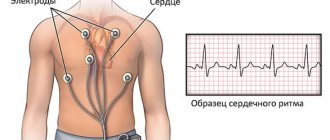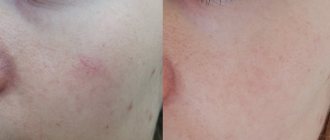Hemorrhage is a dangerous symptom.
No matter the location or cause, this is always a dangerous sign of pathology that requires urgent medical intervention.
This also applies to bleeding from the eyes. Hemorrhage in the eyes occurs due to a violation of the integrity of the vascular wall. But that's not the reason. This is the final point of a complex mechanism resulting from a specific pathological incident in the body.
Hemorrhage may resolve on its own or may lead to permanent vision loss. In any case, if a symptom occurs, an early ophthalmological examination is necessary.
Causes of bleeding from the eyes
There are different concepts - bleeding from the eyes and hemorrhage into the cavity of the eyeball or orbit. The first condition is hemolacria, or the release of blood along with tear fluid. This is a very rare symptom. This condition can be caused by trauma, tumors or infection of the lacrimal glands and ducts, acute injuries to the skull, and poison intoxication (from a snake bite). History describes cases of hemolacria in young people and children, which appeared and disappeared suddenly. No processes that could cause this strange condition have been identified.
The described cases remain a mystery. A rare cause of hemolacria in women is extragenital endometriosis, usually a congenital malformation. This is the growth of endometrial tissue (the inner layer of the uterus) on other organs, in particular on the conjunctival membrane. In this disease, blood comes from the eyes during menstruation.
The second concept is hemorrhage in the eye - a state of bleeding into the structures of the eye, between them, into the orbital cavity. There are many causes for this symptom:
- increased intraocular pressure in glaucoma;
- retinal disinsertion;
- injury to the eyeball (contusion) or base of the skull (symptom of glasses);
- excessive physical activity;
- severe emotional stress;
- prolonged overstrain of the organ of vision;
- sudden dive to depth (diving);
- sudden jumps in blood pressure;
- sharp uncontrolled jumps in blood sugar - from high hyperglycemia to deep hypoglycemia;
- autoimmune diseases accompanied by vascular damage (systemic vasculitis);
- DIC syndrome, blood clotting disorders;
- severe vitamin K deficiency;
- taking antiplatelet agents and anticoagulants (to thin the blood);
- neoplasms of the eye elements (their pressure on the structures of the eye and blood vessels causes a violation of their integrity);
- foreign object entering the eye;
- after major surgical operations.
A sudden dive to depth, physical and emotional overload lead to a rapid increase in pressure inside the blood vessels. Since the vessels of the visual system are small with fragile walls, they suffer first.
Symptoms
The main symptom of hemolacria is the discharge of blood from one eye or from two organs of vision at once. Tears may have a bright bloody scarlet color, a light reddish tint, or contain streaks and inclusions of blood particles.
Helpful information! One small tear of blood may go unnoticed, but a person literally crying blood is sure to attract attention.
Along with blood in the eyes, other accompanying symptoms may be observed: pain, burst eye vessels, itching or burning of the visual organs, visual disturbances (flashes, spots, lightning, narrowing of visual fields, blurred vision), as well as general signs such as malaise, increased body temperature, weakness and others.
Risk group
People at risk of intraocular hemorrhage include patients with hypertension and diabetes mellitus. These are patients who do not control blood pressure or sugar levels and do not receive constant rational therapy.
Therefore, they are at risk of not only vascular complications. Irrational and uncontrolled treatment also includes thoughtless use of blood thinning drugs. These categories of people need regular examination by specialized doctors and control of tests with due frequency.
The risk group includes people with the pathological conditions presented above. This also includes those who enjoy scuba diving. This is an extreme activity. Professional training is required before diving. This also applies to lovers of skydiving, ski jumpers and those involved in a more dangerous type of jumping from cliffs and from extremely high points. A full medical examination and appropriate permission are a prerequisite for engaging in such activities.
Professional athletes whose activities involve high speeds, running, fighting, and jumping are therefore at risk. They can get injured at the base of the skull (from a fall), or to the eyes (in martial arts, football players). Athletes and bodybuilders are in a state of constant physical overstrain. This is an additional risk factor for ocular hemorrhages.
People addicted to alcohol. Alcoholic drinks in large quantities cause aggression. People intoxicated often get involved in fights, which do not always end well.
No one is immune from neoplasms. Until now, it has not been possible to identify a reliable reason for the development of cancer cells in humans. Therefore, prevention consists of maintaining immunity, regular examinations by doctors for early detection of the tumor and its removal in the first stages of the disease.
People in stressful professions - doctors, lawyers, businessmen. Shop workers and miners are susceptible to the penetration of foreign bodies into the eyeball. It is very important for them to wear personal protective equipment when working. Workers in hot shops are exposed to changes in temperature and pressure, which also poses a risk of surges in intravascular pressure.
What to do if the blood vessels in the eyes burst constantly?
Normal redness of the eyes is not a reason for an urgent visit to an ophthalmologist. And if the redness is not accompanied by itching and burning, and the eyes do not hurt, there is no need to worry.
However, if this happens often, you should seriously think about the causes of the phenomenon and reconsider your lifestyle. It is worth giving up bad habits, watching your diet, spending time outdoors, and playing sports. When working at a computer, monitor your body position relative to the monitor. You can read about how to organize your workplace here.
If you experience any discomfort, you should consult an ophthalmologist. The doctor will conduct a diagnostic examination and determine the presence or absence of diseases. In addition, the ophthalmologist can prescribe drops for treatment that will prevent rupture of the vessel walls.
Classification of hemorrhages
Depending on the structure of the eye that has undergone bleeding, there are:
- hemophthalmos;
- hyphema;
- subconjunctival hemorrhage - hyposphagma;
- retinal - into the retina;
- into the orbit, soft tissues of the eye.
Hyphema is the penetration of blood into the anterior chamber of the eye. This condition is a common consequence of blunt trauma to the eye area and is accompanied by pain. Hemophthalmos is characterized by bleeding into the vitreous body - this is a complex and dangerous condition that requires urgent resolution. Symptoms include the appearance of fog before the eyes, which does not go away with blinking, and blurred vision. The retina is the most sensitive part of the eyeball. Small changes in blood vessels easily lead to bleeding. Disposing of excess blood from the retina without damaging its functions is not an easy task.
Hemorrhages can be classified according to severity - from mild to severe, according to the breadth of distribution and involvement of other structures, unilateral or bilateral, for reasons - ocular and somatic.
Symptoms and diagnosis
To detect hemorrhage, it is often enough to look at the whites of the eyes. Red spots appear on them. If hemorrhage occurs in the sclera, the person does not feel discomfort. Retinal hematomas also do not cause pain, but occasionally black spots may appear in front of the eyes, and the contours of objects become blurred.
In addition to blood on the whites of the eyes, there may be a sensation of a foreign body in the eye, which gradually passes. Hyphema causes blurred vision and increased sensitivity to light.
With hemophthalmia, the symptoms are more pronounced. The patient sees dark spots, flashes, floaters and dots before his eyes. In the morning, vision deteriorates as blood particles move and are evenly distributed throughout the vitreous body.
If a large amount of blood is released, exophthalmos occurs. The eyeball moves forward, bloody discharge comes from under the lower eyelid.
First aid
First aid for hemorrhage involves immediately calling an ambulance or going to an emergency room yourself. Before providing medical assistance, you should apply ice (any cold object) to the eye area.
It is forbidden to rub your eyes - this will increase the bleeding, and a possible infection that has penetrated into the blood will spread throughout the body.
You cannot use eye drops yourself or try to remove a foreign body. It is necessary to wait for the doctor, who will explain in detail the circumstances of the occurrence of the process, inform about existing diseases, allergies and medications taken.
When to see a doctor urgently
In some cases, it is necessary to consult a doctor without delay. You should be wary of the following conditions, against the background of which bleeding from the lacrimal ducts occurs:
- high temperature that does not go down or rises again soon after taking antipyretic drugs;
- dizziness, clouding of consciousness and disorientation in space;
- the presence of severe pain in the orbital area, this condition is often observed in cancer;
- if bleeding does not stop for more than 20 minutes;
- if vision is severely impaired, a veil blurs before the eyes.
You should consult a doctor if the person’s condition is severely disturbed. Severe pallor and nausea should be especially alarming. If bleeding from the eyes is observed in a child, then in any case it should be shown to a doctor.
If a person suffers from hemophilia, then he should be urgently taken to the hospital in case of bleeding of any type.
Treatment
Eye bleeding should only be treated by a doctor. Depending on the severity of the disease, the doctor chooses conservative or surgical treatment. Hyposphagma tends to resolve on its own. The doctor's help consists of excluding serious pathology, infection, prescribing decongestant, anti-inflammatory solutions and monitoring the dynamics.
Therapy is selected strictly individually. Surgery may be required. If a lot of time has passed since the injury and the wound has festered, removal of the eye is not excluded.
The task of the victim and his immediate environment is not to panic, provide first aid, deliver the patient to a medical facility as soon as possible, and strictly follow medical prescriptions.
Why do blood vessels burst in a child’s eyes?
Symptoms are more common in adults. However, children are also susceptible to the disease. Most often, the causes of “bursted blood vessels” are crying or physical exertion during games.
Redness of the whites of the eyes also occurs in newborns. This may be due to difficulties passing through the birth canal and the use of drugs to induce labor.
You should not be afraid of a one-time redness of the eyes. However, if a vessel in the eye bursts frequently, do not delay visiting a doctor and receiving appropriate treatment.
The article was checked by the chief ophthalmologist at the Optics Plus eye clinic, Timofeev E.G. 04/22/2021.
Our doctors who will solve your vision problems:
Fomenko Natalia Ivanovna
Chief physician of the clinic, ophthalmologist of the highest category, ophthalmic surgeon. Surgical treatment of cataracts, glaucoma and other eye diseases.
Yakovleva Yulia Valerievna Refractive surgeon, specialist in laser vision correction (LASIK, Femto-LASIK) for myopia, farsightedness and astigmatism.
You can find out the cost of a particular procedure or make an appointment at the Moscow Eye Clinic by phone or using the online appointment form.










